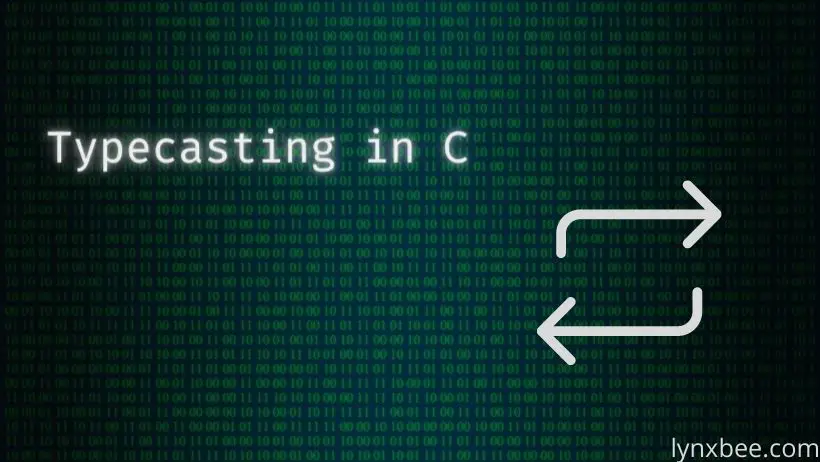Typecasting in C is a powerful tool that every C programmer should master. It allows developers to convert a variable from one data type to another, enhancing flexibility and control over their code. Typecasting is a crucial aspect of C programming that enables efficient memory usage, correct interpretation of data, and better handling of different data types. In this post, we will cover everything you need to know about typecasting in C, including how it works, examples of different typecasting methods, common problems, and how to solve them.
What is Typecasting in C?
Typecasting in C refers to the process of converting one data type into another. This can be done either implicitly or explicitly, depending on how you want the conversion to occur. Implicit typecasting (also known as type promotion) is automatically handled by the compiler, whereas explicit typecasting requires the programmer to use specific syntax to force the conversion.
There are two main types of typecasting in C:
- Implicit Typecasting: The compiler automatically converts data types.
- Explicit Typecasting: The programmer manually converts the data type using casting operators.
Why is Typecasting Important in C?
Typecasting allows developers to manage data in ways that are more efficient and safe. It helps avoid potential issues like data loss, truncation, or unexpected results due to incompatible data types. By properly understanding and applying typecasting in C, you can write code that is both efficient and error-free.
How Typecasting Works in C
In C programming, typecasting works by converting one data type to another so that you can manipulate values appropriately. Let’s explore the two main methods of typecasting:
1. Implicit Typecasting
Implicit Typecasting occurs automatically when data types are mixed during an operation. The compiler promotes a smaller data type to a larger one to prevent data loss.
Example:
#include <stdio.h>
int main() {
int num = 10;
double result = num + 5.5; // Implicit typecasting from int to double
printf("Result: %.2f\n", result);
return 0;
}In this example, the integer num is implicitly converted to a double to perform the addition.
2. Explicit Typecasting
Explicit Typecasting is done manually using the cast operator. You convert one data type into another by specifying the desired type in parentheses before the variable.
Example:
#include <stdio.h>
int main() {
double num = 5.75;
int truncated = (int)num; // Explicit typecasting from double to int
printf("Truncated value: %d\n", truncated);
return 0;
}Here, (int)num explicitly converts the double value to an int, effectively truncating the decimal portion.
Common Use Cases for Typecasting in C
Typecasting can be useful in a variety of situations, including:
- Mathematical Operations: Where integer division can lead to loss of precision, casting to float or double helps maintain accuracy.
- Pointer Typecasting: Converting one pointer type to another can be useful in advanced programming, such as dealing with memory directly.
- Data Serialization: Typecasting helps in converting data into formats suitable for serialization or communication.
How to Set Up Typecasting in C
Setting up typecasting in C requires a good understanding of data types. Here’s a quick guide to implementing typecasting:
- Understand the Data Types: Know the ranges and limits of data types in C, such as int, float, char, etc.
- Use Casting Operators: Use explicit casting when there is a risk of data loss or when you need to ensure the correct type is being used.
- Compile and Test: Always compile and test your program to check if the typecasting works as expected without any warnings or errors.
Probable Issues with Typecasting in C and Solutions
Typecasting can introduce potential problems if not used carefully. Below are common issues and how to address them:
1. Data Loss
- Problem: When converting from a larger data type to a smaller one (e.g., double to int), you may lose information.
- Solution: Only perform typecasting if you are sure the conversion won’t result in significant data loss. For example, truncating a double to an int means losing all fractional values.
2. Overflow and Underflow
- Problem: Converting a larger integer into a smaller data type can result in overflow or underflow, causing unpredictable results.
- Solution: Ensure that the value fits within the range of the target data type before casting.
3. Pointer Typecasting Issues
- Problem: Typecasting pointers incorrectly can lead to segmentation faults or undefined behavior.
- Solution: Always verify that you are casting pointers to compatible types, especially when dealing with void pointers or memory addresses.
Practical Example of Typecasting
Let’s consider a scenario where we have both float and int variables, and we need to perform a calculation with proper precision.
Example:
#include <stdio.h>
int main() {
int a = 5;
int b = 2;
float result = (float)a / b; // Explicit typecasting to get accurate result
printf("Result: %.2f\n", result);
return 0;
}In this code, the explicit cast (float)a ensures that the division is performed in floating-point, providing an accurate result.
Summary and Best Practices for Typecasting in C
- Use implicit typecasting when working with mixed data types in simple arithmetic to avoid unnecessary casting.
- Use explicit typecasting when precision is needed or when working with different pointer types.
- Avoid unnecessary typecasting as it can make your code harder to understand and maintain.
- Be careful with data loss and overflow issues while typecasting, especially when converting from larger to smaller data types.
Icon Insights
- 🔧 Implicit Typecasting: Automatically done by the compiler for compatibility.
- ⚠️ Explicit Typecasting: Use with caution to avoid data loss or overflow.
